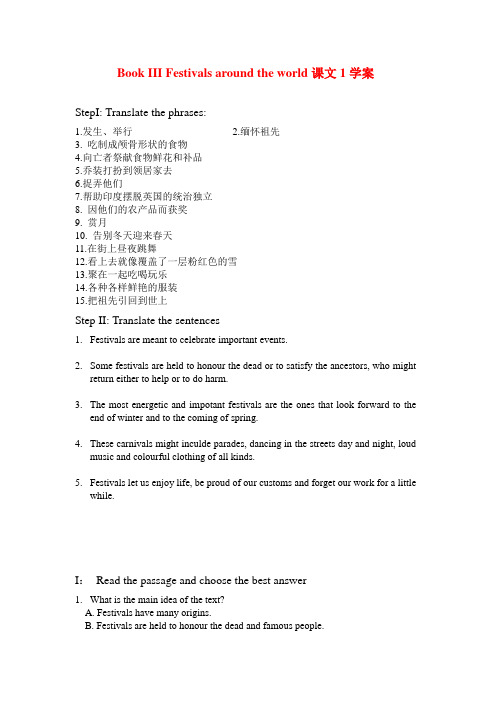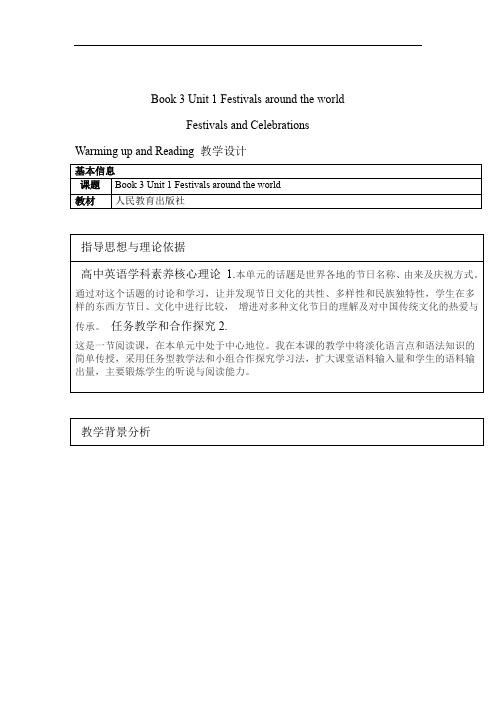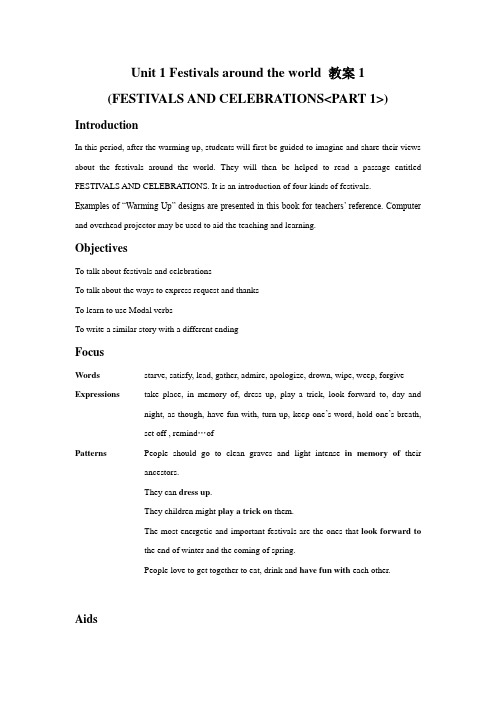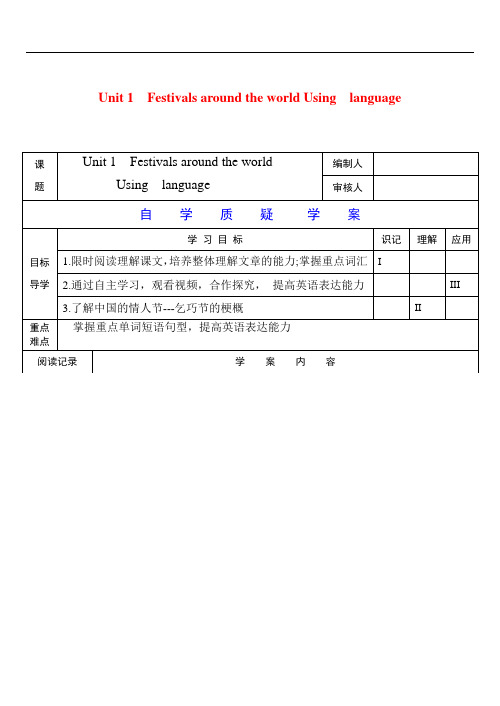高中英语 Unit1 Festivals around the world教案(3) 新人教版必修3
高中英语Unit1 Festivals around the world课文1学案(新人教版必修3)

Book III Festivals around the world课文1学案StepI: Translate the phrases:1.发生、举行____________________2.缅怀祖先___________________________3. 吃制成颅骨形状的食物_____________________________________________4.向亡者祭献食物鲜花和补品__________________________________________5.乔装打扮到领居家去________________________________________________6.捉弄他们________________________7.帮助印度摆脱英国的统治独立________________________________________8. 因他们的农产品而获奖____________________________________________9. 赏月__________________________10. 告别冬天迎来春天________________________________________________11.在街上昼夜跳舞___________________________________________________12.看上去就像覆盖了一层粉红色的雪___________________________________13.聚在一起吃喝玩乐_________________________________________________14.各种各样鲜艳的服装_______________________________________________15.把祖先引回到世上_________________________________________________ Step II: Translate the sentences1.Festivals are meant to celebrate important events.____________________________________________________________________ 2.Some festivals are held to honour the dead or to satisfy the ancestors, who mightreturn either to help or to do harm.____________________________________________________________________ 3.The most energetic and impotant festivals are the ones that look forward to theend of winter and to the coming of spring.____________________________________________________________________ 4.These carnivals might inculde parades, dancing in the streets day and night, loudmusic and colourful clothing of all kinds.____________________________________________________________________ 5.Festivals let us enjoy life, be proud of our customs and forget our work for a littlewhile.____________________________________________________________________I:Read the passage and choose the best answer1.What is the main idea of the text?A. Festivals have many origins.B. Festivals are held to honour the dead and famous people.C. Festivals are held for happy events.D. Festivals are happy times for people to get together.2. The most ancient festivals would celebrate the following except____A. the end of cold weatherB. planting in springC. harvest in autumnD. living happily3. Which of the following is not the festival to honor the dead?A. The Japanese festival ObonB. The day of the Dead in Mexico.C. The western holiday HalloweenD. Japan’s Cherry Blossom Festival4. What can we infer from the passage ?A. People would have feasts, sing and dance at all festivalsB. People celebrate festivals because they don’t want to work.C. By celebrating festivals, people are developing the culture and customs.D. Festivals have only four kinds of origins.II: Language points1.Festivals are meant to celebrate important times of year.1).I meant to go there yesterday.2). These chairs are meant for guests.3). I meant you to buy this book.4). I never meant that you should come alone.5). The red light means “stop”.6). This new order will mean working overtime.7). We ‘ll have to be careful with money but that doesn’t mean that we can enjoy ourselves.归纳意思:1):__________________________ 2):__________________________ [短语链接]1.had meant to do sth.== had planned to do sth.本打算做某事(实际未做)2.be meant to do sth. 1).(尤指因某人的吩咐或根据职责)应该做某事e.g. We are meant to write our names at the top of the paper.2).意在做某事Festivals are meant to celebrate important times of year.3. What do you mean by…?你说/做…是什么意思?【巩固练习】1).I never _______ ______ ____ _______ those comments.(打算让她看那些评论)2)I thought policemen _________ _______ ____ _________ _____ _______.我认为警察的职责就是保护人民。
人教版高中英语必修三Unit 1 Festivals around the World教学设计

Book 3 Unit 1 Festivals around the world
Festivals and Celebrations Warming up and Reading 教学设计
体会古代节日
与现代节日的
节日名称,庆祝目的,国家,及庆祝活动
了解该节日的目的;对中国的清明节,日本的盂兰盆节及墨西哥的亡灵节进行对比,能列举节日活动;对亡灵节进行深入理解,能正确
看待死亡。
通过组织对话的形式,灵活运用语段内的有效信息,做到学以致用
学生结合实际生活,总结春节期间的活动。
还须给出其他活动,拓
识知展学生面。
排序题意在
考查学生对于细节的把握,找出关键词总结节日的意义,重在实际应用
例,知识上
部分难度较大,为得到较好效果,须给出关键词,帮助学生思考归纳)。
高中英语必修3·Unit1·Festivals·around·the·world--Reading教

高中英语必修3·Unit1·Festivals·around·the·world–Reading教案(人教新课标)一、教学目标知识目标1.学生能够了解世界各地的传统节日及其庆祝方式;2.学生能够通过阅读文章来掌握阅读技能和解决阅读难题的策略;3.学生能够学习和应用新单词和短语。
能力目标1.学生能够提高阅读能力,包括快速阅读和理解文章中的信息;2.学生能够运用所学知识和技能,进行文本分析和提炼。
情感目标1.学生能够了解和尊重其他国家和文化的传统节日和庆祝方式;2.学生能够培养兴趣和爱好,学习英语,从中获取快乐和收获。
二、教学重难点重点1.学生能够理解和运用新单词和短语;2.学生能够掌握信息提取的方式和技巧。
难点学生能够提取关键信息,进行总结和归纳。
三、教学准备1.教师教材:人教新课标必修3;2.学生教材:人教新课标必修3;3.多媒体课件:PPT;4.教学设备:电脑、投影仪。
四、教学过程步骤一:导入新课教师呈现PPT,介绍节日的定义和意义,激发学生学习的兴趣。
步骤二:预习讨论教师指派学生阅读课文,并分成小组讨论以下问题:1.课文中介绍了哪些节日?它们来自哪些国家?它们的庆祝方式是怎样的?2.课文中提到了哪些关键信息?你是怎样识别的?3.阅读过程中,你是怎样解决阅读难题的?步骤三:信息筛选教师根据学生的讨论情况,引导学生分析和筛选信息,提取主要的概念和细节信息。
步骤四:语言知识教师介绍本课的语言知识,包括新单词和短语。
学生可以跟随教师一起朗读和背诵。
步骤五:阅读训练在教师的引导下,学生进行快速阅读和精读训练,通过多次阅读来提取关键信息。
步骤六:总结概括教师引导学生总结概括课文中的各个节日及其特点,对学生进行思维启发和拓展。
步骤七:作业布置1.教师布置任务,让学生进行书面作业;2.学生自己进行复习和练习。
五、教学反思在教学过程中,学生学习积极性高,表现出色,能够认真听讲和进行课堂互动。
人教版英语高中必修三Unit 1 Festivals around the world 教案

Unit 1 Festivals around the world 教案1(FESTIV ALS AND CELEBRATIONS<PART 1>) IntroductionIn this period, after the warming up, students will first be guided to imagine and share their views about the festivals around the world. They will then be helped to read a passage entitled FESTIV ALS AND CELEBRATIONS. It is an introduction of four kinds of festivals.Examples of “Warming Up” designs are presented in this book for teachers’ reference. Computer and overhead projector may be used to aid the teaching and learning.ObjectivesTo talk about festivals and celebrationsTo talk about the ways to express request and thanksTo learn to use Modal verbsTo write a similar story with a different endingFocusWords starve, satisfy, lead, gather, admire, apologize, drown, wipe, weep, forgive Expressions take place, in memory of, dress up, play a trick, look forward to, day and night, as though, have fun with, turn up, keep one’s word, hold one’s breath,set off , remind…ofPatterns People should go to clean graves and light intense in memory of their ancestors.They can dress up.They children might play a trick on them.The most energetic and important festivals are the ones that look forward tothe end of winter and the coming of spring.People love to get together to eat, drink and have fun with each other.AidsMultimedia facilities, tape-recorder, photos, diagramsProcedure1. Warming up(1)Warming up by discussingT: Look at the screen and I’ll show you a table and some pictures:Festivals Date Festivals DateNew Year January 1st Teacher’s Day September 10th InternationalWomen’s DayMarch 8th National Day October 1stArbor Day March 12th The Spring Festival Lunar New Year International LaborDayMay 1st Pure Brightness Day April 5thChinese Youth Day May 4th Dragon Boat Festival The 5th day of the 5thlunar monthInternational Children’s Day June 1st Mid-Autumn Festival The 5th day of the 8thlunar monthArmy Day August 1st Lantern Festival The 15th day of thefirst lunar month (2)Warming up by looking and speaking1. Use the following sentences:●When does the Spring Festival usually take place?●What do you do to celebrate it?●What special food do you eat?●What is the origin of the Spring Festival?●Why is the Spring Festival such a big holiday in China?2.Li Mei and Carla are talking on the phone. Carla is asking some more questions about Spring Fe -stival.A: Li Mei, when does the Spring Festival usually take place?B: Well, the date is a little different every year, but it usually happens at the end of January or thebeginning of February.A: What do you usually do to celebrate it?B: My whole family gets together- my grandparents, all my aunts and uncles, and all my cousins. We usually talk about what we’ve done in the past year. Then we cook a lot of food.A: What special food do you eat?B: We almost always make and eat dumplings. That’s the most traditional Spring Festival food. A: What is the origin of Spring Festival?B: Well, there are several old stories about Spring Festival. In old Chinese stories, there was a monster named Nian who would come into towns at the end of the year and frighten people. Some times he would eat them. At some point, people discovered that the monster Nian was frightened of loud noises and the color red. They began to put red paper on their doors and set off firecracker. It became the tradition to do this every year to frighten the monster away from the town.A: Wow! That’s an amazing story! Why is Spring Festival such an important holiday in China? B: I guess it’s like Christmas in Western countries. It’s the most important family holiday all year.2.Pre-reading by talking and sharing1.QuestionsWhat festivals or celebrations do you have in your city or town? What part of a festival do you like best- the activities, the music, the sights, the food or the people who visit?2.PredictionLook at the pictures and title of the passage below. What kind of information you think will be introduced in the passage.3. Reading aloud to the recordingToday we’re going to read a passage about FESTIV ALS AND CELEBRATIONS. Please listen and read aloud about the recording of the text FESTIV ALS AND CELEBRATIONS on page 1. Pay attention to the pronunciation of each word and the pauses within each sentence. I will play the tape twice and you shall read aloud twice, too.4. Reading and underliningNow please read and underline all the useful expressions or collocations in the passage. Copy them to your notebook after class as homework.Collocations from FESTIV ALS AND CELEBRA TIONStake place, in memory of, dress up, play a trick, look forward to, day and night, as though, have fun with, turn up, keep one’s word, hold one’s breath, set off , remind…of5. Reading aloud once again and understanding1. What are festivals of the dead usually for?Festivals of the dead are for honoring or satisfying dead ancestors or others, who some people believe might return to help or harm living people.2. What makes autumn festivals happy events?Autumn festivals are happy events because people are thankful that food is ready for winter and the hard farm work is finished.3. What do people usually do at spring festivals?At spring festivals, people usually have dances, carnivals and other activities to celebrate the end of winter and the coming of spring.4. What is one important reason to have festivals and celebrations?It is important to have festivals and celebrations so we can enjoy life/ be proud of our customs/ forget our work for a little while.5. Compare the festivals of the dead in Mexico, Japan and China. What things are similar? What things are different?The Chinese, Japanese and Mexican festivals of the dead all have customs to honor the dead. The Chinese and Japanese go to clean their ancestors and the Mexicans offer food, flowers and gifts to the dead. However, there are some difference. The Mexicans eat special food that looks like bones, something the Chinese and Japanese do not do.6. What is one important reason to have festivals and celebrations?Festivals let us enjoy life, be proud of our customs and forget our daily life for a little while.6. Discussing in groupsTrue or False1.The ancient people needn’t worry about their food.2.Halloween used to be a festival intended to honor the dead.3.Qu Yuan was a great poet who people honor a lot in China.4.Mid-autumn Festival is held to celebrate the end of autumn.5.Easter celebrates the birth of Jesus.Answer: FTTFF7.Closing down by taking a quizWhat festivals are mentioned in each paragraph?P1.celebrate the end of the cold weather, planting in spring and harvest in autumn; celebrate when hunters catch animals.P2. Festivals of the Dead Japan -----Obon Mexico------Day of the Dead America------Halloween P3. Festivals to Honor People Dragon Boat Festival Columbus Day (India) October 2P4. Harvest Festivals, Thanksgiving Festival and Mid-Autumn festivalP5. Spring festival Carnival Easter Cheery Blossom Festival。
高中英语新人教版精品教案《必修三 Unit 1 Festivals around the world》

高中课程标准实验教科书英语必修3设计主题: Fetiva around the word所教年级:高一所教单元:第一单元1教学设计理论依据:英语教学是一种动态教学或者活动教学,教学过程是交际活动的过程。
只有从组织教学活动入手,大量地进行语言实践,使英语课堂交际化,才能有效地培养学生的英语交际能力。
《高中英语课程标准》要求我们要改变以往过分强调英语单词和语法知识的简单传授的倾向,加强对学生实际语言能力的培养。
因此,本节课各个环节的教学设计都要突出体现以下几种新理念:1、任务型教学模式(ta-baed teaching method)2、以学生为主体,重视体验参与3、突出交际性,注重读写的实用性4、正视个体差异,多用积极的正面评价2教学背景分析一、教材分析:本课是高中英语必修三第1单元,课题是 Fetiva around the word 。
这是一节阅读课。
在本单元中处于中心地位。
内容介绍了世界各地不同主题的节日和庆祝活动。
我在本课的教学中将淡化语言点和语法知识的简单传授,采用任务型教学法和小组合作探究学习法,扩大课堂语料输入量和学生的语料输出量,主要锻炼学生的听说与阅读能力。
二、学生情况分析:高一 3 班的学生具有以下两个特点:1、他们已经初步具备了略读、跳读等阅读技巧以及确定主题句,预测材料内容等阅读微技能,形成了基本的阅读策略。
但是很多学生英语基础相对较弱,语言交际能力相对较差。
2、很多学生求知欲旺盛,思维活跃,好胜心强,但学习缺乏主动性,有畏难心理。
因此,教师要通过精心设计使他们感兴趣的活动,用活动教学的方法来调动学生的学习积极性,在师生互动,生生互动的过程中完成教学任务并达到目标。
3教学目标分析1、知识目标:⑴词汇和语言点⑵理解课文大意,用所学词汇复述课文,并用所学词汇与学生交流沟通。
2、能力目标在运用语言的过程中培养学生观察、分析、思维与自学能力,加强记忆力,提高英语综合运用能力,激发创造能力。
高中英语 Unit 1 Festivals around the world Using language学案 新人教版必修3

课 题
Unit 1 Festivals around the world
Using language
编制人
审核人
自 学 质 疑 学 案
目标
导学
学 习 目 标
识记
理解
应用
1.限时阅读理解课文,培养整体理解文章的能力;掌握重点词汇
1.用turn的相关短语完成句子
1)He __________________so far.他到目前还没有出现。
2)You’re always __________ late for everything!你总是迟到!(做事慢慢吞吞的)
2.用keep的相关短语完成句子
1)You promised you would take the children camping, so you must_____ _____ _____.
5.明显的,显而易见的adj._______________________
6.悲哀,悲伤n.________________7.drown v.______________
8.出现;到场____________
9.守信用;履行诺言_______________
10.出发;动身;使爆炸______________
_______________________________________________________________
III.观看视频,整理笔记,进行疑难点梳理
IV.小组合作
V.在线测在学案上勾画出知识树及时巩固及自查)
自学
反思
第2页
训 练 展 示 学 案
人教版英语必修三-Unit-1-Festivals-around-the-world-教案设计_
人教版英语必修三-Unit-1-Festivals-around-th e-world-教案设计Unit 1 Festivals around the world I.单元教学目标II.目标语言1.5 Learning about Language 分词汇和语法两部分。
其中Discovering useful words and expressions是本单元单词的英文释义练习和用文章中的词汇的适当形式填空;Discovering useful structures 是以文章内容为载体在语境中练习语法,掌握情态动词。
由此可以看出本教材已明显地由结构为特征的传统语法训练转变到以交际功能为特征的功能语法训练,充分体现了新教材话题、功能、结构相结合的特点。
1.6 Using Language 是英语听说读写的全面运用的练习。
1.6 ①Listening 是课文的延伸,通过听几位学生参加Trinidad Carnival 节日游行的两段对话,使学生体会参加节日游行的真实情景,既训练听力一通过问题训练了他们的分析能力。
1.6 ②Speaking 分为两部分。
第一部分通过电话突出交际用语功能的训练;第一部分让学生编对话,可以按自己的想象、经历为内容,训练思维和表达能力。
1.6 ③Reading 是发生在情人节的一个令人伤心的爱情故事,其中又插入了一个“七巧节”的故事。
阅读后的讨论不仅帮助学生理解文章主旨大意,更重要的是让学生学会寻求解决问题的方法。
1.6 ④ Writing 的任务是写一个与文章结尾不同的结局。
旨在让学生通过思考写出自己的想法,尝试自己解决问题。
总之,通过本单元的系统学习,让学生了解世界各国的节日及民俗,学习有关节日的词汇,并能够丰富语言知识,提升用英语表达观点的能力。
2. 教材重组2.1 口语从话题内容和功能上分析Warming Up 与Workbook中的Listening和Talking相一致,旨在启发学生讨论、思考并引出本单元关于节日的话题,可以整和成一节任务型“口语课”。
Unit1Festivalsaroundtheworld(新课标版高一英语必修三教案教学设计)
Unit 1 Festivals around the world(新课标版高一英语必修三教案教学设计)Unit 1 Festivals around the worldThe First Period (Warming up & Pre-reading)Step One: Lead-inFree Talk: Did you have a good time in your winter holidays?When did you feel most happy and excited? Why?( At the Spring Festival. Because it's the most important festival in our country....)Step Two: Warming up1. Let the Ss think about the other Chinese festivals.( Lantern Festival, Pure Brightness Festival, Dragon Boat Festival, Mid-Autumn Festival, New Year's Day, Chung Yeung Festival....)2. Discussion One1)Let the Ss look at the information about Chinese festivals and discuss another four Chinese festivals according to the example in warming up: When does the festival come?What do people celebrate?What do people do?Festivals Date festivals DateNew Year January1st Teachers' Day September 10thInternational Women's Day March 8 National Day October 1stArbor Day March 12th The Spring Festival Lunar New Year International labor Day May 1st Dragon Boat Festival the fifth day of the fifth lunar monthInternational Children's Day June 1st Mid-Autumn Festivalthe 15th day of the 8th lunar monthArmy Day August 1st Lantern Festival the 15th day of the 1st lunar monthChinese Youth Day May 4th Pure Brightness Day April the fifth2) Let the Ss fill in the form in the warming up and ask some to share their opinions with the whole class.3 Discussion TwoTalk about some foreign festivals.( Christmas, April Fools Day, Easter Day, Halloween, Valentine's Day, Thanksgiving Day, Obon...)Step three: Pre-readingLet students think about the questions:1) What is your favourate holiday of the year? Why?2)What festivals or celebrations do you enjoy in your city or town? Do you like spending festivals with your family or with friends? What part of a festival do you like best- the music, the things to see, the visits or the food?Step Four: Language Points1.mean to do 打算做某事mean doing 意味着….I never meant him to work for us.Passing the entrance examination means being admitted into college.2. celebrate vt.(1) do sth to show that a day or an event is important 庆祝;祝贺celebrate Christmas / one’s birthday / a wedding anniversary / a victory(2) praise and honor 赞扬;称颂The names of many heroes are celebrated by the poets.词语辨析:celebrate, congratulatecelebrate后常接日期、事情或场合。
人教新课标高中英语必修三Unit 1 Festivals around the world全章教案
人教新课标高中英语必修三Unit 1 Festivals around the world全章教案I.教学内容分析本单元的中心话题是“节日”,主要讲述了不同地区不同种类的节日。
Warming Up部分设计了小组活动,通过图表填写让学生区分中国的传统节日与别国节日的异同,目的在于激活学生已有的节日背景知识,引出主题,为以后几堂课学习热身。
Pre-reading 通过几个问题,调动学生已有的知识和经验,激发学生想了解更多节日的好奇心,让他们主动参与到主题教学活动中,为下面学习阅读文章作铺垫。
Reading 部分先简要介绍了一下早期各种节日的起源以及存在的原因,然后又分别介绍了几种世界各地的节日,依次的顺序是亡灵节、纪念名人的节日、丰收节、春天的节日等。
Comprehending由四个部分组成。
第一、三、四部分通过表格形式,第二部分通过让学生回答问题的方式,鼓励学生积极思考,加深对课文的理解。
Learning about Language 部分主要突出了本单元的语法项目——情态动词的用法。
这些情态动词主要有:can,could,may,might,will,would,shall,should,must,can’t 等的用法。
Using Language 部分中包括了听、说、读、写几个部分的内容。
学生可通过对Trinidad Carnival、情人节等一些节日的学习,分析问题,锻炼自己的思维能力。
阅读后的习题及讨论不仅帮助学生理解文章的主旨大意,更重要的是让学生寻找解决问题的方法。
Learning Tip部分主要建议学生搜集各种资料,查询与世界各地节日有关的信息,了解各种节日的来源与内涵。
II.教学重点和难点1. 教学重点(1) 本单元的生词和短语;(2) 掌握一些情态动词的基本用法;(3) 了解有关节日和民俗,掌握有关词汇,如custom,religious等。
2. 教学难点(1) 增进学生对中国节日的理解,了解和感悟外国的节日;(2) 提高学生的社会文化素质,加强跨国文化素质;(3) 培养学生运用资源策略。
高中英语 Unit1 Festivals around the world 教案必修3
Unit 1 Festivals around the worldTheFirst PeriodTeaching Aims:1. Learn the following words and phrases: dress up, fighting, crime, argument, destruction.2. Train the students’ speaking and listening abilities.3. Learn to talk about festivals, customs and habits.Teaching Important Point:Improve the students’ speaking and listening skills by talking about and listening to something about festivals.Teaching Difficult Point:How to further develop the students’ speaking and listening skills.Teaching Methods:1. Pair work and group work to train the students’ speaking ability.2. Listening and choosing activity to train the students’ listening ability. Teaching Aids:1.Pictures2. a projector3. a tape recorderTeaching Procedures:Step Ⅰ. GreetingsGreet the whole class as usual.StepⅡ. Free Talk and Lead-in1.Ask the students to talk about the Spring Festival in China.2.Ask about some other festivals, such as: Lantern Festival, the Dragon BoatFestival, Tomb Sweeping Day, Mid-Autumn Day, New Year’s Day…3.Ask about some foreign festivals, such as: Christmas Day, Thanksgiving Day,Mother’s Day, April Fool’s Day, Valentine’s Day…StepⅢ. Warming up1.Look at the pictures and discuss the three questions.⑴. Do you know the names of the festivals?⑵. Do you know which countries the festivals come from?⑶. What are the people in the pictures doing? Why are they doing this?2.Ask the students to talk about each picture on Page 8.3.Ask the students to think of a Chinese festival and a foreign festival, andthen work in pairs to compare them..StepⅣ. Listening1.Do a listening and choosing exercise about the following three festivals:Mardi Gras, Ramadan and Easter.2.Ask the students to work together to describe one of their favouritefestivals.StepⅤ. Speaking1.Ask the students if they would like a new holiday, and ask them to decide whata new holiday should be about.2.After the students prepare for a while, teacher asks some students to talkabout their new holiday separately.Step Ⅵ. Summary and Homework1.Ask the students to remember the festival and learn to use them..2.Try to collect more information about festivals and prepare for next part. The Second PeriodTeaching Aims:1.Learn and master the following words: honour, ancestor, nation,self-determination, purpose, generation, faith, joy, light.2.Train the students’ reading ability.3.Let the students learn about the relation between festivals and history andculture.Teaching Important Points:1.Improve the students’ reading ability.2.Help the students learn about foreign history and culture by reading aboutfestivals.Teaching Difficult Point:How to help the students understand the passage exactly.Teaching Methods:1.Discussions before reading and after reading to make the students interestedin what they will read and further understand what they have read.2.Fast reading and careful reading to understand the passage correctly.3.Pair or group work to make the students take an active part in the activitiesin class.Teaching Aids:1. a TV set and a VCD2. a projector3. a recorderTeaching Procedures:StepⅠ. GreetingsGreet the students as usual.StepⅡ. Discussion and Lead-in1.Watch a program about a festival.2.Ask the students to talk about the program.3.Ask the students to discuss the questions below.﹙four questions﹚4.Learn the new words in the passage.StepⅢ. Reading1.Ask the students to read the passage silently and quickly to get the generalidea.2.Ask the students to answer some questions.﹙three questions﹚3.Re-read the passage carefully to further understand it. Then work in groupsof four to discuss some questions.4.Read aloud the passage and try to understand it better.StepⅣ. Listening and ConsolidationAsk the students to listen to the tape and finish the “true” or “false” exercise on Page11.StepⅤ. Summary and HomeworkPreview next part— Language study.The Third PeriodTeaching Aims :1.Review the new words appearing in the last two periods.2.Learn to use the modal verbs — must, have to, have got to.Teaching Important Points:1.Learn to guess the missing word according to the given sentence.2.Master the modal verbs correctly.Teaching Difficult Point:How to use “must”, “have to”, “have got to” properly and how to use their negative forms correctly.Teaching Methods:1.Practice and consolidate the words learned in the last two periods.2.Giving example s to explain the difference between “must” and “have to” andthe difference between “mustn’t” and “don’t have to”.3.Making sentences to consolidate the usages of the modal verbs.Teaching Aids:1. a projector2.some slides3.some picturesTeaching Procedures:StepⅠ.GreetingsGreet the whole class as usual.StepⅡ. Revision1.Ask the students to review something about Kwanzaa, such as the birth ofit, the purpose of it, the way of celebrating it, and the seven principlesof it.2.Ask students some questions about the passage.3.Find the right explanation for each of the words.﹙nation, faith,determination, purpose, generation, ancestor, peace trick﹚4.Word Study. Ask the students to choose the best word to fill in each blank. StepⅢ. Grammar1.Modal Verbs: must, have to, have got to.2.The negative forms of the modal verbs.3.Do the exercises on Page13.StepⅣ. PracticeDo the exercises on Page79.StepⅤ. Summary and Homework1.Review the contents in this class, paying attention to the differencesbetween “must” and “have to” and the difference between “mustn’t”and “don’t have to”.2.Do more exercises to learn to use them properly.The Fourth PeriodTeaching Aims:1.Learn the following words and phrases: reminder, care about, respect, cycle,fool, play tricks on, take in, invitation2.Review the language points and modal verbs in this unit.3.Train the students’ integrating skills, especially writing skill.Teaching Important Points:eful expressions: care about, play tricks on, take in2.Practice expressing and supporting an opinion.3.Write an invitation.Teaching Difficult Points:1.How to create a festival and describe it.2.How to write an invitation.Teaching Methods:1.Review method to consolidate the language points of this unit.2.Individual, pair or group work to finish the reading and writing tasks. Teaching Aids:1. a projector2.some slidesTeaching Procedures:StepⅠ. GreetingsGreet the whole class as usual.StepⅡ. Revision1.Review the usages of the modal verbs learned before.2.Read about some other festivals. Besides, ask the students to create a festivaland then write an invitation to invite their guests to their festival.StepⅢ. Reading1.Read some information about each festival on Page9.2.Ask the students some questions about the festivals in the passage.﹙fourquestions﹚3.Learn some useful expression in the passage.﹙care about, play tricks on / playa trick on, take in﹚4.Give the students some more time to re-read the passage and discuss the questionsafter the passage with their partners, and then check them out.StepⅣ. Writing1.Ask the students to finish the contents mentioned on Page 10. Then write a shortdescription of their own festival. At the end, tell their classmates about their festival.2.Read the tips on Page 10, which will tell you how to write an invitation. Afterthat, write the invitation. At the end, exchange papers to comment and correct it.StepⅤ. Summary and Homework1.Practice reading and writing about festival.2.Learn more about festivals, customs and habits of foreign countries as wellas those of their own country.The Fifth PeriodTeaching Aims:1.Review the usages of modal verbs which express “obligation”.2.Sum up some other main usages of these modal verbs.Teaching Important Points:1.How to correctly use modal verbs which express “obligation”.2.How to tell the differences be tween “mustn’t” and “don’t have to”.3.How to understand the meaning of the structure “should/ought to +have +p.p.”.4.How to correctly use the negative forms of “had better”, “ought to” and “haveto”.Teaching Difficult Points:How to correctly choose modal verbs in different situations.Teaching Methods:1.Review method and inductive method to enable the students to make clear whatthey have learned.2.Practice to make the students master what they have learned correctly. Teaching Aids:1.a projectoer2.some slides3.a multimediaTeaching Procedures:StepⅠ. GreetingsGreet the whole class as usual.StepⅡ. Lead – inStepⅢ. Revision of the Usages of the Modal VerbsStepⅣ. PracticeStepⅤ. Summary and Homework。
- 1、下载文档前请自行甄别文档内容的完整性,平台不提供额外的编辑、内容补充、找答案等附加服务。
- 2、"仅部分预览"的文档,不可在线预览部分如存在完整性等问题,可反馈申请退款(可完整预览的文档不适用该条件!)。
- 3、如文档侵犯您的权益,请联系客服反馈,我们会尽快为您处理(人工客服工作时间:9:00-18:30)。
课题 Unit 1 Reading--- language points 授课时间 3.4 课型 New 二次修改意见
教学目标
知识与技能 1. To master some usages of words, phrases and structures. 2. To finish the exercises about the language points we leant today.
过程与方法 Help Ss master the way they study the key words and phrases by learning them 情感态度价值观 Develop the students ‘consciousness of using the words and phrases in correct situation 教材分析
重难点 1 To finish the exercises about the language points we leant today. 2. How to analyze the sentence structures
教学设想
教法 Task-based method, Discussion, Cooperation 学法 Task-based method, Discussion, Cooperation, Pair-work 教具 Multimedia and other normal teaching tools
课堂设计 目标展示 1.To study the key words and phrases: look forward to, look into, ,look out, look up to, look down on/upon, food was difficult to find, with…, either…or…,as if/though 2. To learn to them in correct situation 预习检测 1 Ask the students to read and write some words to check their preview.. 2Translate the sentences 1).She has been looking forward to having a chance to pay a visit to Taiwan. 2).They are looking into the cause of the accident. 3).I wish you wouldn’t look down on/upon this kind of work. 4).With a lot of things to do , we can’t kill time by playing cards. 5).My teacher looked as though/if he had known the thing completely. 质疑探究 How to learn to use the key words and phrases in correct situation: look forward to, look into, ,look out, look up to, look down on/upon, food was difficult to find, with…, either…or…,as if/though 精讲点拨 1.look forward to期望;期待;盼望 (鲜活例句)She has been looking forward to having a chance to pay a visit to Taiwan. 她一直盼望能有机会去台湾观光。 [点津] look forward to中的to为介词,其后要接名词、代词或动名词作宾语。 look into 往……里看; look out 向外看;当心;小心 look up to 仰视;尊敬;赞赏 look down on/upon 俯视;轻视;看不起 ①They are looking into the cause of the accident. 他们正在调查事故的原因。 ②I wish you wouldn’t look down on/upon this kind of work. 我希望你不要看不起这种工作。 2.as though/if“仿佛;好像”,引导方式状语从句或表语从句;下面这句中其引导的是表语从句。 ①It seems as if the boy has lost his way. 这个男孩好像迷路了。 (1)as though/if后面的从句可用虚拟语气,表示一种假设或一种不大可能的事。从句表示与现在事实相反时,谓语动词用一般过去时;表示与过去事实相反时,用had+过去分词;若表示将来的可能性不大的情况,用would/could/might+动词原形。 ②She loves the boy as if she were his mother. 她爱这男孩,就好像她是他的母亲一样。 ③He talks about Rome as if he had been there before. 他说起罗马来好像他以前去过似的。 ④She talks and talks as if she would never stop. 她说了又说好像永远停不下来。(不可能是事实) (2)as though/if后面的从句有时也用陈述语气,这是因为从句中的情况往往是可能发生的、可能被设想为真实的或是事实。 ⑤It looks as though/if it is going to rain. 天似乎要下雨。 (3)从句的省略:若as though/if引导的从句的主语与主句主语一致,且从句谓语为be,则省略“从句主语+be”,从句就变成了“as though/if+形容词/副词/名词/介宾短语/分词/不定式”。 ⑥Tom raised his hand as if (he was) to say something .汤姆举起手好像要说什么。 3.food was difficult to find是“主语+be+adj.+不定式”结构,其中food是find的逻辑宾语。
Ask the students to summarize the skills while doing the exercises. 宁县五中导学案
①English is difficult to learn well in a short time.英语难以在短时间内学好。 ②The boy is difficult to teach.这男孩很难教。 2)此结构的用法总结如下: (1)形容词多为表示主语性质、特征的词,如easy, difficult, hard, important等 (2)不定式和句子主语是动宾关系,但用主动形式表被动含义 (3)不定式有时会带上自己的逻辑主语(for sb.) (4)不定式中的动词若是不及物动词,其后要加相应的介词 ③This kind of job is very easy for them to do. 这种工作对他们来说是很容易做的。 ④The chair is comfortable to sit on.椅子坐起来很舒服。 当堂检测 1.Complete the sentences 1) They are looking the cause of the accident. 2). I wish you wouldn’t look down this kind of work. 3) On this important feast day, people eat food in the shape of skulls and cakes “bones”_ on_ them.. 2.Translation 4). Some festivals are held to honor the dead, or satisfy and please the ancestors, who could return either to help or to do harm. 5). The most energetic and important festivals are the ones that look forward to the end of winter and to the coming of spring. 6). Festivals let us enjoy life, be proud of our customs and forget our daily life for a little while. 六、作业布置 1.Do the first two exercises on P4,SB. 2.Complete the first exercise on P74 ,EB.
板 书 设 计 1.The key words and phrases: look forward to, look into, ,look out, look up to, look down on/upon, food was difficult to find, with…, either…or…,as if/though 2.The key sentences: 1)At that time people would starve if food was difficult to find,especially during the cold winter months. 2). The most energetic and important festivals are the ones that look forward to the end of winter and to the coming of spring. 3) He talks about Rome as if he had been there before. 4) Some festivals are held to honor the dead, or satisfy and please the ancestors, who could return either to help or to do harm. 教学反思
